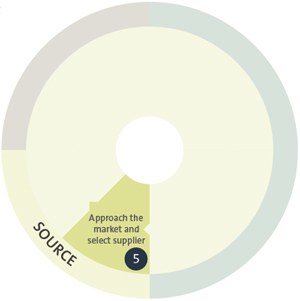Part 7: Approaching the market and selecting a supplier
 7.1
7.1
The fifth stage in the procurement life cycle involves initiating the procurement process in the supplier market, providing information to potential suppliers, answering any questions they might have, and selecting a preferred supplier.
7.2
It is important that public organisations:
- plan the whole procurement process; and
- ensure that good process and practice are followed in implementing the procurement process, including evaluating tender responses and making decisions about suppliers.
7.3
When shortlisting potential suppliers or before negotiating or awarding the contract, public organisations should independently verify that a supplier is who they claim to be and has the capacity and capability, both financial and otherwise, to deliver throughout the life of the contract.
Initiating the procurement process in the market
7.4
Public organisations should consider the process and relevant principles and requirements. These can be found in the Government Rules of Sourcing.
7.5
Failing to properly plan the procurement process could risk the procurement not being handled in a principled way. For example, the procurement process might be flawed and lack integrity. Or the conduct of individuals and public organisations might fall short of the appropriate ethical standards. In either case, the procurement process could be at risk of being challenged, proving costly in terms of time and money.
Implementing the procurement process
7.6
Procurement good practice guidance and rules exist to address some of the issues we have seen when looking into specific procurement processes. The guidance includes the Government Rules of Sourcing, Cabinet circulars, legislative requirements, and our 2006 and 2008 publications on good procurement practice. The guidance helps to:
- ensure that decisions are made carefully and for appropriate reasons;
- promote open and fair competition, domestically and internationally; and
- protect against the risk of corruption or inappropriate influence.
7.7
It is important that public organisations follow relevant rules and guidance when selecting a supplier. Failure to do so puts an organisation at risk of litigation or claims of bias. It can also damage the public's trust and confidence in the organisation.
Our proposed audit work
7.8
We are frequently asked to look at public organisations' procurement processes. Much of our work on procurement is about process and whether public organisations follow established good practice guidelines and rules.
7.9
Our work in the last few years has identified issues with the way some public organisations have carried out the procurement process. We will continue to look for improvement in the process because it is important to the integrity of the way the public sector does business.
7.10
We are also interested in what we understand to be the increasing use of panels of suppliers by public organisations to secure efficiencies in the selection process. We have not previously done any work specifically on panels of suppliers.
7.11
A supplier panel is a list of suppliers of goods and services that have been pre-approved by a public organisation and that have agreed to the terms and conditions of the procurement. The panels are set up to enable efficient future procurement of goods or services. A supplier panel should have suppliers that offer the best skills and experience required to deliver the specified goods or services.
7.12
Suppliers are appointed to the panel through a competitive process and the public organisation selects the supplier either for direct appointment or through a competitive process involving two or more panel members.
7.13
We are interested in how these panels are used, how well they are operating, and how effective they are in increasing efficiency while ensuring open and fair competition.
7.14
We propose to carry out two specific projects on supplier panels.
| We will survey a sample of public organisations to find out the extent to which panels of suppliers are used, how they are used, and their purpose. We intend to publish the survey results. Based on the survey results, we will identify aspects of the effectiveness of panels of suppliers for future work. For example, we might focus on whether public organisations are using panels appropriately, are following good procurement practice in establishing and operating panels, and have the capability to use them effectively. We might also consider whether the expected benefits are being realised. |

